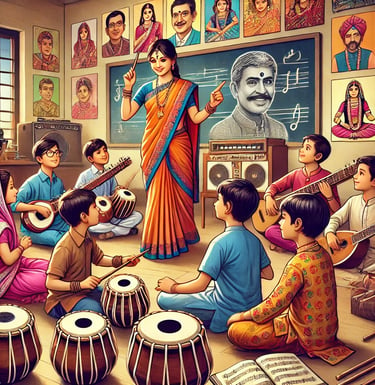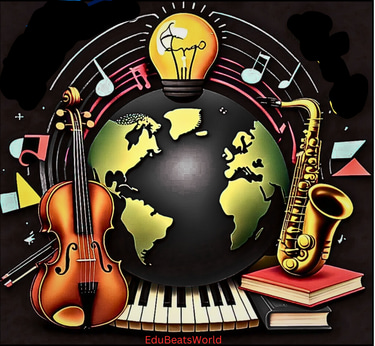NEP 2020’s Take on Music Education in Schools: Urgent Recommendations, Proven Benefits, and Career Opportunities
NEWS DIGEST
edubeatsworld.com
Introduction: The Current State of Music Education in India
Music education in India is deeply rooted in our cultural heritage but remains underdeveloped in schools. Critical questions arise: How many schools actively teach music? How many prioritize it? The lack of structured music curricula leaves many students unaware of its benefits and the associated career opportunities. The National Education Policy (NEP) 2020 emphasizes the integration of arts and music into education, recognizing their roles in cognitive growth, cultural identity, and overall well-being.


The Importance of Music Education and Current Challenges
Music fosters emotional intelligence, enhances cognitive abilities, and nurtures creativity. Research shows that exposure to music positively impacts brain development, activating multiple regions crucial for skills like memory and concentration. However, many schools prioritize core subjects, such as literacy, over music, resulting in limited access and a lack of standardized curricula. Unlike countries with well-defined music programs, India requires a national framework for music education.
To be effective, music education must be modernized by incorporating both traditional Indian music and contemporary genres.
Benefits of a Well-Structured Music Curriculum
A well-structured music curriculum provides students with the opportunity to develop various skills. Studies indicate that learning music can enhance memory, improve spatial-temporal skills, and boost IQ levels in young children. Moreover, music helps reduce stress, which has become an increasingly important concern in schools. Engaging with music—both through listening and creating—releases dopamine, the "feel-good" hormone, improving mood and reducing anxiety. In the aftermath of the pandemic, the therapeutic benefits of music have become more evident, with a growing recognition of its role in fostering mental well-being.
Furthermore, music education contributes to the development of critical life skills such as discipline, patience, and teamwork. In a classroom setting, students learn to collaborate, listen actively, and express themselves creatively. These skills are vital for developing social-emotional competencies, which are essential for personal and professional growth.
Introducing children to music at a young age, ideally around 5 or 6 years old, fosters early brain development. It aids in language acquisition, enhances their understanding of rhythm and patterns, and improves memory retention. As music education becomes more mainstream, these benefits will likely have a profound impact on students' holistic development, equipping them to face challenges and succeed in an increasingly complex world. To make music education effective and impactful, schools must overcome existing limitations. A curriculum that emphasizes both traditional Indian music and contemporary global genres, coupled with innovative teaching methods, can modernize music education and make it more relevant to today’s students.
The Role of NEP 2020 in Promoting Music Education
The National Education Policy (NEP) 2020 has introduced several reforms aimed at creating a more holistic, flexible, and multidisciplinary education system. One significant reform is the inclusion of music as a key component of the school curriculum. NEP 2020 advocates for a balanced approach to education, where subjects like music are integral to a student's development rather than being sidelined. The policy highlights that the arts and music enhance cognitive and creative abilities, contributing positively to students' happiness and well-being.
By integrating music and the arts into education, NEP 2020 aims to promote cultural identity, preserve India’s diverse cultural heritage, and uplift society through creative expression. However, implementing these changes on a large scale remains challenging, as many schools face budget constraints, a lack of trained music teachers, and limited access to musical instruments. There is also an urgent need for government support to create a standardized music curriculum that all schools can adopt.
Under NEP 2020, music education is seen as an opportunity to encourage interdisciplinary learning. For instance, students can explore the connection between music and mathematics, as rhythm and patterns are deeply rooted in mathematical concepts. The NEP's emphasis on integrating music into education provides Indian schools with a chance to cultivate a generation of students who are not only academically capable but also culturally aware and creatively inclined.
Career Opportunities in Music: Expanding Horizons for Students
In recent years, music has become a respected career path in India. Various job roles have emerged as viable options for individuals passionate about music, including performance artists, music educators, music therapists, and positions in music journalism and criticism. A comprehensive music curriculum can help students explore these career paths from a young age, preparing them for a world where creative professions are increasingly valued.
One notable example is the growing field of music therapy, which has gained prominence as mental health receives greater attention. Music therapists work with individuals facing emotional, cognitive, or physical challenges, using music as a medium to promote healing and well-being. Additionally, roles such as music critics and journalists allow individuals to engage with music analytically, exploring trends and critiquing performances.
For students in Indian schools, exposure to these diverse career paths broadens their understanding of possibilities beyond traditional careers. This is why NEP 2020’s emphasis on a multidisciplinary approach is so crucial; it encourages students to pursue both academic and creative interests.
The Future of Music Education in India
The National Curriculum Framework (2022) advocates for experiential learning, where subjects are taught through activities that foster curiosity and creativity. This includes integrating music education into the core curriculum to support cognitive, social, and emotional development. As schools begin to recognize the importance of music in developing well-rounded individuals, partnerships with musicians and access to resources are becoming more prevalent.
In the future, schools in India will likely collaborate more with music organizations and artists to create meaningful learning experiences for students. This will help students appreciate the cultural richness of Indian music while also exposing them to global music traditions. With sustained efforts and support from educational policies like NEP 2020, the future of music education in India appears promising, transforming music from a mere extracurricular activity into a core component of the educational journey.
contact@edubeatsworld.com
© 2024. All rights reserved.
